| Listing 1 - 10 of 14 | << page >> |
Sort by
|
Book
ISBN: 9789004274051 9789004274068 9004274065 9004274057 1306771986 9781306771986 Year: 2014 Publisher: Leiden Brill
Abstract | Keywords | Export | Availability | Bookmark
 Loading...
Loading...Choose an application
- Reference Manager
- EndNote
- RefWorks (Direct export to RefWorks)
"Only a few decades after the Holocaust, Belgian Jews, like most European Jewries, are under the attack of forces stemming from a variety of sources. How do they confront and stand these new hardships? Research done all over Europe from 2012 through 2013 tried to answer this question. Among the cases investigated, the Belgian Jewry is one of the most interesting. It is both versatile and representative, revealing essential components of the general experience of European Jews today. Conceptual considerations pave the way to the study of their plight that has been, by any criterion, anything but "usual". Belgian Jews, it appears, are "like" many other Jewries in Europe but "a little more". They highlight the question: is allosemitism at all surmountable?"--
Antisemitism --- Jews --- Antisémitisme --- Juifs --- History --- Histoire --- Antisémitisme --- Hebrews --- Israelites --- Jewish people --- Jewry --- Judaic people --- Judaists --- Ethnology --- Religious adherents --- Semites --- Judaism --- Anti-Jewish attitudes --- Anti-Semitism --- Ethnic relations --- Prejudices --- Philosemitism
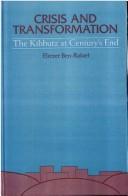
ISBN: 0585065217 9780585065212 9780791432259 0791432254 9780791432266 0791432262 0791432254 0791432262 079149635X Year: 1997 Publisher: Albany, N.Y. State University of New York Press
Abstract | Keywords | Export | Availability | Bookmark
 Loading...
Loading...Choose an application
- Reference Manager
- EndNote
- RefWorks (Direct export to RefWorks)
This book examines kibbutz life following the Israeli economic crisis of 1985, focusing on the kibbutz's dramatic transformation from a well-defined social structure to a collective identified principally by its cultural preoccupations. It centers on the contradictions endemic to kibbutz identity. Ben-Rafael shows how the crisis brought together a general pro-change Zeitgeist with the interests of the kibbutz's stronger social segments and individuals to produce widespread changes and the fragmentation of kibbutz reality as a whole. The book's findings are based on a large-scale research investigation (1991-1994) headed up by Ben-Rafael that included twenty research studies and involved the participation of researchers from diverse social-science disciplines. The book also provides a statistical abstract and a comprehensive kibbutz bibliography.
Kibbutzim. --- Political Science --- Law, Politics & Government --- Socialism, Communism & Anarchism --- Kibbutz settlements --- Kibbutzes --- Ḳibutsim --- Collective settlements --- Economic order --- Israel

ISBN: 1280466693 9786610466696 1417510420 904740145X 9781417510429 9789047401452 9789004125353 9004125353 9781280466694 6610466696 Year: 2002 Publisher: Leiden ; Boston : Brill,
Abstract | Keywords | Export | Availability | Bookmark
 Loading...
Loading...Choose an application
- Reference Manager
- EndNote
- RefWorks (Direct export to RefWorks)
Ten years after the creation of the state of Israel, David Ben Gurion wrote to 50 of the best thinkers and researchers in the world asking ""Who is a Jew?"" This publication contains the letters that answered this question, the original text of Ben Gurion, and an analysis by Shalow Tasavi.
Jews --- Identity, Jewish --- Jewish identity --- Jewishness --- Jewish law --- Jewish nationalism --- Identity. --- Ethnic identity --- Race identity --- Legal status, laws, etc. --- Ben-Gurion, David, --- Green, David, --- Yariv, S. S., --- Bin Jūriyūn, --- Ben-Guryon, Daṿid, --- Grin, Daṿid, --- Gurion, David Ben-, --- Guryon, Daṿid Ben-, --- Gruen, David Joseph, --- Gryn, David, --- Ben Gourion, --- Ben Gourion, David, --- Grün, David, --- בו־גוריון, דוד --- בן גוריון --- בן גוריון, דוד, --- בן־גוריון, דוד, 1886־1973 --- בן־גוריון, דוד, --- בן־גוריון, דויד, --- בן־גוריון, ד. --- בן־גוריון, ד., 1886־1973 --- בן־גוריון, --- בן־גורין, דוד, --- בן־גריון, דוד --- בן־גריון, ד. י., --- בן-גוריון, דוד --- בן-גוריון, דוד, --- בן-גוריון, ד., --- בן-גוריון, --- יריב, ס. ש. --- יריב, ס. ש., --- بن-غوريون، دافيد --- بن-غوريون، دافيد
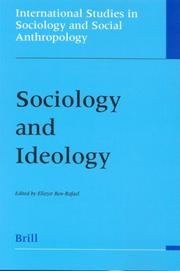
ISBN: 1280467517 9786610467518 1423712056 904740226X 9781423712053 9789047402268 9004131043 9789004131040 9781280467516 661046751X Year: 2003 Publisher: Leiden Boston Brill
Abstract | Keywords | Export | Availability | Bookmark
 Loading...
Loading...Choose an application
- Reference Manager
- EndNote
- RefWorks (Direct export to RefWorks)
When examining how the social sciences have dealt with ideology, one's first impression is often one of considerable confusion. Sociology in particular is the scene of heated debates about ideology. These debates go sometimes so far as to echo doubts of participants with regard to their opponents' scientific endeavor, even straightforward denials of their scientific status. This volume brings together a series of articles that throw light on selected aspects of this intricate matter by well-known sociologists Boudon, Wittrock, Arnason, Touraine, Smolicz, Secombe, Wieviorka, Ben-Rafael and Sternberg.
Sociology --- Philosophy. --- Philosophy
Book
ISBN: 1282603167 9786612603167 9047440110 9789047440116 9789004174702 9781282603165 661260316X 9004174702 Year: 2009 Publisher: Boston : Brill,
Abstract | Keywords | Export | Availability | Bookmark
 Loading...
Loading...Choose an application
- Reference Manager
- EndNote
- RefWorks (Direct export to RefWorks)
This book deals with transnationalism and captures its singularity as a generalized phenomenon. The profusion of transnational communities is a factor of fluidity in social orders and represents confrontations between contingencies and basic socio-cultural drives. It has created a new era different from the past at essential respects. This is an age of enriching cultural diversity fraught with threatening risks inextricably linked to contemporary globalization. National sovereignty is eroded from above by global processes, from below by aspirations of sub-national groups, and from the sides - by transnational allegiances. This is the backdrop against which this book delves into the fundamental issues relating to the nature, scope and overall significance of transnationalism.
Emigration and immigration. --- Globalization. --- Multiculturalism. --- Transnationalism. --- Cultural diversity policy --- Cultural pluralism --- Cultural pluralism policy --- Ethnic diversity policy --- Multiculturalism --- Social policy --- Anti-racism --- Ethnicity --- Cultural fusion --- Immigration --- International migration --- Migration, International --- Population geography --- Assimilation (Sociology) --- Colonization --- Global cities --- Globalisation --- Internationalization --- International relations --- Anti-globalization movement --- Trans-nationalism --- Transnational migration --- Government policy
Book
ISBN: 128294892X 9786612948923 9004189181 9789004189188 9789004188921 9004188924 Year: 2010 Publisher: Leiden Boston Brill
Abstract | Keywords | Export | Availability | Bookmark
 Loading...
Loading...Choose an application
- Reference Manager
- EndNote
- RefWorks (Direct export to RefWorks)
This book is about new forms of religiosity and religious activity emerging in the context of their dialectic relations with contemporary multicultural realities. World religions are effectively a major agent of the multiculturalization of contemporary societies. However, multiculturalism pushes them not only toward change and reforms, but also toward new conflicts between and within them. This process should remind us of the Jewish legend of the Golem – an animated being created by man which finally challenges the latter’s control over it - a dialectic relation, indeed. World religions today greatly contribute to a world (dis)order that is multicultural both when viewed as a whole, and from within most societies that compose it. It is a development that contrasts both with the assumption that globalization implies one-way homogenization and convergence to Western modernity, and the expectation that globalization would be bound to polarize homogeneous civilizations.
Religious pluralism. --- Multiculturalism --- Religious aspects.
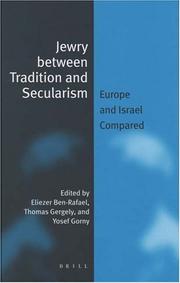
ISBN: 9004151400 9789004151406 9786611399269 1281399264 9047409647 Year: 2006 Volume: 6 Publisher: Leiden ; Boston : Brill,
Abstract | Keywords | Export | Availability | Bookmark
 Loading...
Loading...Choose an application
- Reference Manager
- EndNote
- RefWorks (Direct export to RefWorks)
Jews --- Judaism --- Secularism --- Juifs --- Judaïsme --- Judaisme --- Sécularisation --- Identity. --- History --- Identité --- Histoire --- Judaism and secularism --- Orthodox Judaism --- 296 --- Religions --- Semites --- Secularism and Judaism --- Jewish sects --- Ex-Orthodox Jews --- Hebrews --- Israelites --- Jewish people --- Jewry --- Judaic people --- Judaists --- Ethnology --- Religious adherents --- Identity --- Relations&delete& --- Nontraditional Jews --- Judaïsme. Jodendom --- Religion --- Relations --- Judaism and secularism. --- History. --- Nontraditional Jews.
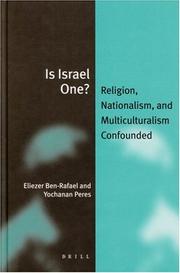
ISBN: 1280868120 9786610868124 1429453109 1433704668 9004143947 9789004143944 9781429453103 9781433704666 9781280868122 6610868123 9789047407539 Year: 2005 Publisher: Leiden Boston Brill
Abstract | Keywords | Export | Availability | Bookmark
 Loading...
Loading...Choose an application
- Reference Manager
- EndNote
- RefWorks (Direct export to RefWorks)
This book delves into Israeli society-an emblematic example of multiculturalism-where internal divides emerge from value systems relating contrastingly to religion, in a context of globalization, immigrant-society behavior, and a deep majority-minority division.
Multiculturalism --- Cultural pluralism --- National characteristics, Israeli. --- Jews --- Israeli national characteristics --- Cultural diversity --- Diversity, Cultural --- Diversity, Religious --- Ethnic diversity --- Pluralism (Social sciences) --- Pluralism, Cultural --- Religious diversity --- Culture --- Cultural fusion --- Ethnicity --- Identity. --- Israel --- Social conditions. --- Ethnic relations. --- National characteristics, Israeli --- Identity
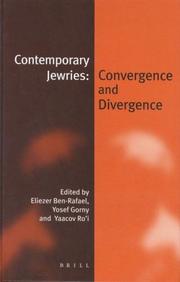
ISBN: 1280467207 9786610467204 1417538961 9047401948 9781417538966 9789047401940 9789004129504 9004129502 Year: 2003 Volume: 2 Publisher: Leiden: Brill,
Abstract | Keywords | Export | Availability | Bookmark
 Loading...
Loading...Choose an application
- Reference Manager
- EndNote
- RefWorks (Direct export to RefWorks)
This work aims to explore whether one can still speak, at the beginning of the 21st century, of one Jewish People encompassing all Jews in the world and based on shared principles of collective identity. It covers factors of convergence and divergence that characterize contemporary Jewries.
Jews --- Jewish diaspora. --- Judaism --- Diaspora, Jewish --- Galuth --- Human geography --- Identity, Jewish --- Jewish identity --- Jewishness --- Jewish law --- Jewish nationalism --- Identity. --- Diaspora --- Migrations --- Ethnic identity --- Race identity --- Legal status, laws, etc. --- Jews - Identity. --- Judaism - 20th century.
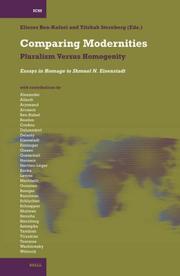
ISBN: 1280868147 9786610868148 1429453133 9047407563 1433706458 9781429453134 9789004144071 9004144072 9781433706455 9004144072 9781280868146 661086814X 9789047407560 Year: 2005 Publisher: Leiden , Boston Brill
Abstract | Keywords | Export | Availability | Bookmark
 Loading...
Loading...Choose an application
- Reference Manager
- EndNote
- RefWorks (Direct export to RefWorks)
The authors of this collection, renowned scholars from around the world, explore the tensions and dilemmas that impact pluralism and homogeneity in modern societies. This book is in homage to Shmuel Noah Eisenstadt. We honor his ground-breaking work in the comparative study of modernities and civilizations.
Cultural pluralism --- Comparative civilization --- Pluralism (Social sciences) --- Congresses
| Listing 1 - 10 of 14 | << page >> |
Sort by
|

 Search
Search Feedback
Feedback About UniCat
About UniCat  Help
Help News
News